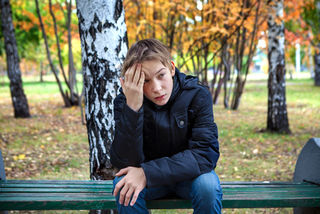The Dos and Don'ts of Parenting Your Child Through COVID-19
How to emotionally support your anxious child through this health scare.
Anxiety over the coronavirus (COVID-19) has been steadily building these last several weeks. Many of you have likely lived through other global health scares before. Swine Flu (remember H1N1?), West Nile Virus, SARS, and Ebola are some of the few that come to my mind.Having experienced other large-scale health concerns may serve as reassurance that these alarms come to pass. You can tell yourself, remember when that last alarm happened? It passed; it was scary, and we were ultimately OK. We can also use our prior knowledge of the media’s tendency towards dramatizations and challenge the hysteria the media promulgates in much of the coverage they provide on pressing issues. In this case, their reportage of COVID-19.
Generally, past experiences provide a logical counter-balance to new anxieties that arise over fresh situations. However, while you may be familiar with the apprehension surrounding a health or catastrophic event and use past events to challenge your current fears, your children don’t have this same history and frame of reference. That makes it a different, scarier experience for them. Add in a child with preexisting anxiety, and you have a recipe for one extremely anxious child. Their life may be disrupted because of this scare: Sleep disturbances, diminished school attendance, and preoccupations with getting sick may be some issues you are noticing in your anxious child.

Therefore, it is important all of us parents take a pause and mindfully parent our children through this alarm.In helping our children emotionally through this health scare, the following is a list for parents on the "dos" and "don’ts" of parenting your child through the coronavirus:Do:1. Check your own anxiety. This is a big one. If you are feeling overwhelmingly anxious about the virus and not working through your feelings, this will most certainly rub off on your child.
Talk to someone if you feel anxious. Check your facts. Reframe catastrophic scenarios in your mind. Take deep breaths. But whatever you do, don’t allow your anxiety to fester and ooze. Your child will pick up on it, guaranteed, and this may act as a barrier in them seeing you as a possible support for them if and when they feel anxious
2. Talk with your school-age children (but don’t go overboard). Children, even younger ones, know when something is off. Not talking about what is happening, either because you are feeling anxious or are worried about making them anxious, often backfires and only makes them more worried.Be reassuring. Ask them how they are feeling emotionally and listen to their answers. Don’t brush away what is happening, that they are already aware of, under the carpet.3. Remind them of where their power lies. Often in times of stress that feels beyond our control, we feel powerless, helpless, and like there is nothing we can do to support ourselves. We give up on finding solutions and give in to our anxiety.Remind your children (and yourself, if necessary) that they maintain plenty of power—and where to find it. Their power lies in things like handwashing, not touching their face, not sharing snacks, and using a tissue. There is something both empowering and comforting in learning to find where we can take our own responsibility in a situation where there is much out of our control.
4. Use this as an opportunity to discuss gratitude. For their health, for living in a country where medical help is readily available, for the invention of medicine that can control and treat symptoms.5. Lead by example. If you are asking your children to wash their hands more often or not to touch their faces, try your hardest to practice what you preach. It will give you more empathy around what you are asking them to do, and modeling these behaviors will be your children’s best teacher.
Don’t:1. Have adult conversations about the coronavirus in front of them. Even when you think their attention is otherwise engaged, they are listening. Children are sponges: If they are in the vicinity, they pick up and hear almost anything.I still get a kick out of observing this in my own children. My husband and I can be talking about something mundane and boring, and as soon as we say “ice cream” or “movie,” my children pipe up immediately. Save your conversations—especially the worried ones—for when your children are not present.
2. Go overboard with cleaning. I’ll never forget how the mother of a childhood friend of mine (who, granted, came from a large family) would go overboard each time one of her children got sick—even with the common cold. She would follow them around with disinfectant spray, carry paper towels around with her, and make everyone feel tense and worried. Don’t do this to your children.Do prepare according to CDC guidelines, but make it feel natural and not fatalistic. As you stay on top of your and your children’s hygiene, remind them that regardless of a health outbreak, it is important to keep our hands and surfaces clean.3. Brush your children’s fears away. There is a difference between offering reassurance and being dismissive. An example of a dismissive response would be: What are you afraid of? Things are going to be fine. Reassurance includes both emotional attunement and coaching. It sounds like, I understand you are worried. Can you tell me more about how you are feeling and what you are worried about?
Only after that emotional attunement has happened, offer some reassurance, such as, I see you’re worried. I have seen many other health scares. I know the media tends to make it sound really scary, but it’s usually like that with the news. I have always been fine, and I’m confident we will be fine through this. Know I am here to talk if you are worried.
4. Blindly follow the media hysteria. Do get your facts straight. Do your own research—from reputable sites. Be careful what you read in the news, and how much exposure you’re getting to the scary stuff. Scientifically, this has been shown to affect you. I’ll say it again for emphasis: Get the facts, educate yourself, and allow that to guide you.Copyright: Leah Katz, 2020. This article also appears in the March 18th issue of the Jewish Review.

